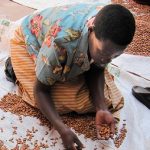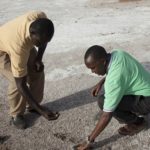In 2004, BMZ was one of the first organizations to partner with IFPRI in supporting the NEPAD Secretariat and the implementation of CAADP. BMZ’s partnership allowed IFPRI, between 2004 and 2007, to prepare a roadmap to guide the CAADP implementation process, establish the program’s credibility among development partners, and facilitate the adoption of the CAADP agenda by more than 20 African countries and by regional economic communities. From 2008 to 2011, IFPRI assisted the NEPAD Secretariat and regional economic communities in implementing and advocating for the CAADP agenda at the regional, sub-regional, and national levels. IFPRI also helped build the capacity of national teams and experts to lead the analytical work.
Information Services and Analyses on Food and Nutrition Security
The food price crisis of 2007–2008 threatened global food security. The access of households to quality and nutritious food was especially at risk due to their diminished purchasing power. In an effort to assist the United Nations (UN) Secretary-General and the UN High-Level Task Force (HLTF) on the Global Food Security Crisis, GIZ supported IFPRI in delivering relevant information and cutting-edge analyses on food and nutrition policy actions.
The Global Hunger Index
To rank countries and illustrate trends in hunger worldwide, IFPRI, Concern Worldwide, and Welthungerhilfe developed the Global Hunger Index (GHI), which captures four indicators of hunger: undernourishment, child wasting, child stunting, and child mortality. Using data from the Food and Agriculture Organization of the United Nations (FAO), the World Health Organization (WHO), and UNICEF, the index ranks countries on a 100-point scale, with 0 being the best score (no hunger) and 100 being the worst. The GHI is updated annually to track progress. By highlighting this information, the index serves as a tool for mobilizing political will and promoting effective policies to combat hunger. For more than a decade, the GHI has helped to increase country accountability in order to reduce hunger and undernutrition.
Tracking Hunger and Strengthening Resilience: An IFPRI-Germany Partnership towards Sustainable Development
IFPRI has been partnering with German development agencies, universities, and nongovernmental organizations (NGOs) for more than three decades to build the evidence base needed to effectively tackle pressing development issues.
Highlights of Recent IFPRI Research and Partnerships with Germany
This brochure highlights key research collaborations between IFPRI and German institutions in recent years. For more than three decades, the International Food Policy Research Institute (IFPRI) has engaged in strong partnerships with German development agencies, universities, and nongovernmental organizations (NGOs) to build the evidence base needed to effectively tackle pressing development issues. Initially, IFPRI and >> Read more
World Soil Day: Advancing Soil Health through Research
December 5 marks World Soil Day. Through its cutting-edge research, IFPRI has been informing policies and strategies that protect the soil for the benefit of the billions of people who depend on it.




